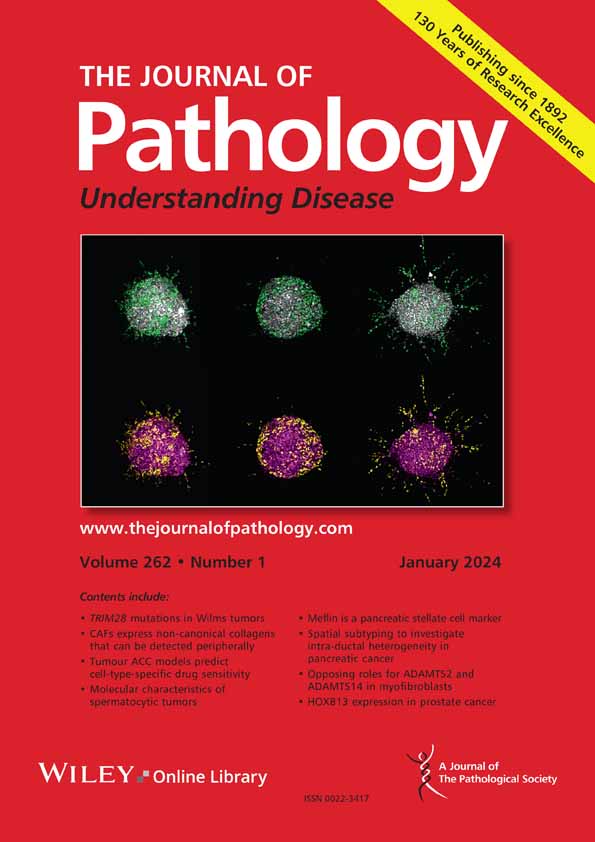求助PDF
{"title":"神经生长因子诱导因子(VGF)是乳腺癌向脑部转移的分泌介质。","authors":"Rita Carvalho, Liliana Santos, Inês Conde, Ricardo Leitão, Hugo RS Ferreira, Célia Gomes, Ana Paula Silva, Fernando Schmitt, Carina Carvalho-Maia, João Lobo, Carmen Jerónimo, Joana Paredes, Ana Sofia Ribeiro","doi":"10.1002/path.6319","DOIUrl":null,"url":null,"abstract":"<p>Brain metastases are one of the most serious clinical problems in breast cancer (BC) progression, associated with lower survival rates and a lack of effective therapies. Thus, to dissect the early stages of the brain metastatic process, we studied the impact of brain organotropic BC cells’ secretomes on the establishment of the brain pre-metastatic niche (PMN). We found that BC cells with specific tropism to the brain caused significant blood–brain barrier (BBB) disruption, as well as microglial activation, in both <i>in vitro</i> and <i>in vivo</i> models. Further, we searched for a brain-organotropic metastatic signature, as a promising source for the discovery of new biomarkers involved in brain metastatic progression. Of relevance, we identified VGF (nerve growth factor inducible) as a key mediator in this process, also impacting the BBB and microglial functions both <i>in vitro</i> and <i>in vivo</i>. In a series of human breast tumors, VGF was found to be expressed in both cancer cells and the adjacent stroma. Importantly, VGF-positive tumors showed a significantly worse prognosis and were associated with HER2 (human epidermal growth factor receptor 2) overexpression and triple-negative molecular signatures. Further clinical validation in primary tumors from metastatic BC cases showed a significant association between VGF and the brain metastatic location, clearly and significantly impacting on the prognosis of BC patients with brain metastasis. In conclusion, our study reveals a unique secretome signature for BC with a tropism for the brain, highlighting VGF as a crucial mediator in this process. Furthermore, its specific impact as a poor prognostic predictor for BC patients with brain metastasis opens new avenues to target VGF to control the progression of brain metastatic disease. © 2024 The Pathological Society of Great Britain and Ireland.</p>","PeriodicalId":232,"journal":{"name":"The Journal of Pathology","volume":"264 2","pages":"132-147"},"PeriodicalIF":5.6000,"publicationDate":"2024-07-29","publicationTypes":"Journal Article","fieldsOfStudy":null,"isOpenAccess":false,"openAccessPdf":"","citationCount":"0","resultStr":"{\"title\":\"Nerve growth factor inducible (VGF) is a secreted mediator for metastatic breast cancer tropism to the brain\",\"authors\":\"Rita Carvalho, Liliana Santos, Inês Conde, Ricardo Leitão, Hugo RS Ferreira, Célia Gomes, Ana Paula Silva, Fernando Schmitt, Carina Carvalho-Maia, João Lobo, Carmen Jerónimo, Joana Paredes, Ana Sofia Ribeiro\",\"doi\":\"10.1002/path.6319\",\"DOIUrl\":null,\"url\":null,\"abstract\":\"<p>Brain metastases are one of the most serious clinical problems in breast cancer (BC) progression, associated with lower survival rates and a lack of effective therapies. Thus, to dissect the early stages of the brain metastatic process, we studied the impact of brain organotropic BC cells’ secretomes on the establishment of the brain pre-metastatic niche (PMN). We found that BC cells with specific tropism to the brain caused significant blood–brain barrier (BBB) disruption, as well as microglial activation, in both <i>in vitro</i> and <i>in vivo</i> models. Further, we searched for a brain-organotropic metastatic signature, as a promising source for the discovery of new biomarkers involved in brain metastatic progression. Of relevance, we identified VGF (nerve growth factor inducible) as a key mediator in this process, also impacting the BBB and microglial functions both <i>in vitro</i> and <i>in vivo</i>. In a series of human breast tumors, VGF was found to be expressed in both cancer cells and the adjacent stroma. Importantly, VGF-positive tumors showed a significantly worse prognosis and were associated with HER2 (human epidermal growth factor receptor 2) overexpression and triple-negative molecular signatures. Further clinical validation in primary tumors from metastatic BC cases showed a significant association between VGF and the brain metastatic location, clearly and significantly impacting on the prognosis of BC patients with brain metastasis. In conclusion, our study reveals a unique secretome signature for BC with a tropism for the brain, highlighting VGF as a crucial mediator in this process. Furthermore, its specific impact as a poor prognostic predictor for BC patients with brain metastasis opens new avenues to target VGF to control the progression of brain metastatic disease. © 2024 The Pathological Society of Great Britain and Ireland.</p>\",\"PeriodicalId\":232,\"journal\":{\"name\":\"The Journal of Pathology\",\"volume\":\"264 2\",\"pages\":\"132-147\"},\"PeriodicalIF\":5.6000,\"publicationDate\":\"2024-07-29\",\"publicationTypes\":\"Journal Article\",\"fieldsOfStudy\":null,\"isOpenAccess\":false,\"openAccessPdf\":\"\",\"citationCount\":\"0\",\"resultStr\":null,\"platform\":\"Semanticscholar\",\"paperid\":null,\"PeriodicalName\":\"The Journal of Pathology\",\"FirstCategoryId\":\"3\",\"ListUrlMain\":\"https://onlinelibrary.wiley.com/doi/10.1002/path.6319\",\"RegionNum\":2,\"RegionCategory\":\"医学\",\"ArticlePicture\":[],\"TitleCN\":null,\"AbstractTextCN\":null,\"PMCID\":null,\"EPubDate\":\"\",\"PubModel\":\"\",\"JCR\":\"Q1\",\"JCRName\":\"ONCOLOGY\",\"Score\":null,\"Total\":0}","platform":"Semanticscholar","paperid":null,"PeriodicalName":"The Journal of Pathology","FirstCategoryId":"3","ListUrlMain":"https://onlinelibrary.wiley.com/doi/10.1002/path.6319","RegionNum":2,"RegionCategory":"医学","ArticlePicture":[],"TitleCN":null,"AbstractTextCN":null,"PMCID":null,"EPubDate":"","PubModel":"","JCR":"Q1","JCRName":"ONCOLOGY","Score":null,"Total":0}
引用次数: 0
引用
批量引用


